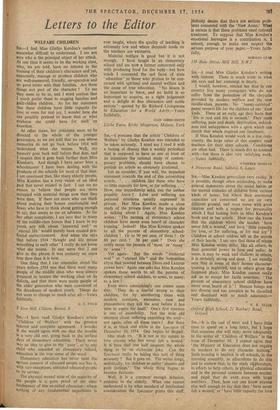Letters to the Editor
WELFARE CHILDREN SIR, I find Miss Glatlys Kendon's outburst somewhat difficult to understand. I am not sure who is the principal object of her attack. At one time it seems to be the working class, who, we are told, have no interest in the training of their children's characters and yet, pparently, manage to produce children who are well-mannered, friendly, co-operative and on good terms with their families. Are these things not part of the character ? To me they seem to be so, and I must confess that I much prefer them to nagging families and guilt-ridden children. As for her statement that these children have little capacity for love or even for real joy, I wonder how she can possibly pretend to know that or what evidence she could have for such an assertion.
At other times, her criticisms seem to be directed to the whole of the younger generation, as we are told that no one whose memories do not go back before 1914 will understand what she means. Well, my memory goes back well before that date, and I suspect that it goes back further than Miss Kendon's. And though I have never been a schoolmaster I have been dealing with the products of the schools for most of that time. I am convinced that, like many elderly people, Miss Kendon has a rosy vision of an ideal past that never existed in fact. I can see no reason to believe that people are more occupied with material things now than they were then. If there are more who can think about making their homes comfortable and fewer who have to think about getting enough to cat, that seems to me an advance. As for her other complaints, I am sure that in many of the middle-class homes that I knew in my Youth any talk about • immortal soul' or eternal life' would merely have created pro- found embarrassment. And when she says that before 1914 ' thought and life meant something to each other' I really do not know what she means. In any sense that I can give to the phrase it was certainly no more true then than it is now.
One thing that I can remember about the Years before 1914 was that there were many People of the middle class who were always prepared to lecture the working class on its defects, and that there were many people of the older generation who were convinced of the &cadence of modern youth. Things do not seem to change so much after all.—Yours faithfully, O. C. FIELD 2 Sion Hill, Clifton, Bristol, 8


































 Previous page
Previous page